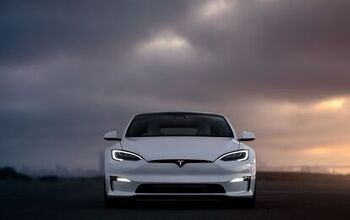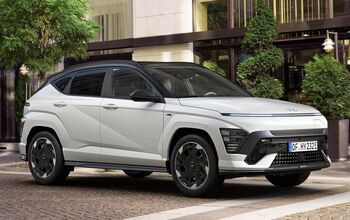Survey Breaks Down EV Preferences By Politics and Ethnicity

A recent opinion survey has attempted to break down the public interest in all-electric vehicles based on key demographics. While the results were largely predictable, there were some novel takeaways that could be of interest to automakers hoping to market the vehicles. The data also shows how trends may be shifting, with the prognosis being less than ideal for EVs.
The big takeaway was that there’s a pretty hard divide between Republicans and Democrats in terms of EV interest. A majority of Republicans (57 percent) said they wouldn’t even consider buying an electric car. By contrast, only about 20 percent of Democrats said the same — with 15 percent saying they would definitely purchase an EV while 41 percent said they’d at least consider it.
Democrats were also more inclined to own an EV already, with 4 percent of the whole saying they’d buy another one. Only 1 percent of the surveyed Republicans said the same, with a matching 1 percent saying they already owned an EV and wouldn’t be interested in another.
The survey was conducted by BlueLabs, an information technology services and consulting firm based in Washington, DC. While your author is not broadly familiar with the company, it claims to have conducted over 1,000 randomized experiments and hundreds of studies that have “driven significant gains in some of the highest profile private sector, advocacy, and government programs.”
Though BlueLabs does not appear to be an unbiased actor. It was founded by a quartet of former analysts working for the Democratic National Committee, most of whom cut their teeth working for the Obama campaign. The rest of the staff also appears to be DNC employees, many of whom likewise worked for Hilary Clinton and/or the Obama administration. Something to keep in mind, especially while examining the political demographics.
That said, the data presented appears sound enough in itself with BlueLabs perhaps only being guilty of being a little more optimistic about EV adoption than the numbers might suggest. The firm suggests there is a plurality of Americans who “definitely or might consider an EV for their next purchase.” It also claimed that purchasing preferences have “held steady” between the current survey (conducted in August) and the previous one (conducted in February).
However, the resulting data doesn’t really support this. While the shift is admittedly modest, respondents have clearly moved toward being less inclined to want an all-electric vehicle. At the same time, the percentage of those who have already purchased an EV remained flat.
I’m willing to believe the above can be attributed to a standard margin of error or possibly the difference in where data samples came from. However, we’ve seen other reports suggesting that public interest in electrified vehicles has plateaued, and sales data that appears to back that up.
BlueLabs informed InsideEVs that it reached out to “a mixed pool of 2,422 adults.” However, it did not specify what parts of the country the samples were from.
“BlueLabs goes to great lengths to make sure its surveys are a representative sample of the US population. Bluelabs balances the challenges of declining polling response rates by conducting surveys via SMS, cell, landline, online, and text-to-web. These techniques allow us to reach more representative people to increase accuracy,” a spokesperson told the outlet.
Representative sampling based on “urbanicity” showed that people living in cities were more prone to EV acceptance. This was unsurprising, as EVs tend to make more sense in an urban environment — assuming you have a garage in which to charge them. Rural residents who are forced to drive longer distances would undoubtedly be less well suited to EV ownership.
Political differences between the two groups and gaps in the charging infrastructure may have ended up influencing the results as well. BlueLabs further examined this by including data that showed urban Republicans were more inclined to consider electric vehicles. While they were still far less likely to shop electric, they were noticeably more interested than their rural counterparts.
Though preferences sorted by ethnicity might be the most interesting. BlueLabs asserted in its report that Hispanic Americans are the demographic most likely to buy an all-electric car. While Black Americans expressed the highest amount of interest overall, they were also the group that expressed the least amount of interest in buying any new vehicles right now. White Americans ended up being the most representative of the national average, which makes sense as they’re presumably the most populous demographic in the survey.
Roughly 21 percent of all respondents stated they were not interested in buying or leasing any new vehicles. That’s actually higher than one might expect, as there’s usually not more than 20 percent of the population that’s even considering a new vehicle in any given year. However, since the survey is relatively noncommittal, focusing on an interest in buying rather than definitive future purchases, we can assume respondents might have been a little more eager.
Either way, BlueLabs believes that EV preferences would improve if more people were made aware of available tax credits. The survey seems to suggest that around 40 percent of Americans have zero awareness of government incentives tied to electric vehicles with a scant minority feeling they’re well informed on the topic.
That seems impossibly low to me. But I’m also someone who has to read about the matter nearly every day. People who are not permanently plugged into the automotive industry wouldn’t have the same exposure. However, it still seems implausible that nearly half the country has never even heard of EV tax credits.
BlueLabs recommended reaching out to Black Americans specifically, saying it presented “an opportunity to address hesitation toward EVs.” Though Hispanics were nearly as unaware and no group was actually well versed on the matter — either because they’ve never heard of it or because the revised regulatory scheme implemented by the Biden administration has complicated the issue by making eligibility contingent on regional content requirements, vehicle pricing, and income brackets.
[Images: Ford Motor Co.; BlueLabs]
Become a TTAC insider. Get the latest news, features, TTAC takes, and everything else that gets to the truth about cars first by subscribing to our newsletter.

A staunch consumer advocate tracking industry trends and regulation. Before joining TTAC, Matt spent a decade working for marketing and research firms based in NYC. Clients included several of the world’s largest automakers, global tire brands, and aftermarket part suppliers. Dissatisfied with the corporate world and resentful of having to wear suits everyday, he pivoted to writing about cars. Since then, that man has become an ardent supporter of the right-to-repair movement, been interviewed on the auto industry by national radio broadcasts, driven more rental cars than anyone ever should, participated in amateur rallying events, and received the requisite minimum training as sanctioned by the SCCA. Handy with a wrench, Matt grew up surrounded by Detroit auto workers and managed to get a pizza delivery job before he was legally eligible. He later found himself driving box trucks through Manhattan, guaranteeing future sympathy for actual truckers. He continues to conduct research pertaining to the automotive sector as an independent contractor and has since moved back to his native Michigan, closer to where the cars are born. A contrarian, Matt claims to prefer understeer — stating that front and all-wheel drive vehicles cater best to his driving style.
More by Matt Posky
Latest Car Reviews
Read moreLatest Product Reviews
Read moreRecent Comments
- Stephen Never had such a problem with my Toyota products.
- Vulpine My first pickup truck was a Mitsubishi Sport... able to out-accelerate the French Fuego turbo by Renault at the time. I really liked the brand back then because they built a model for every type of driver, including the rather famous 300/3000GT AWD sports car (a car I really wanted, but couldn't afford.)
- Vulpine A sedan version of either car makes it no longer that car. We've already seen this with the Mustang Mach-E and almost nobody acknowledges it as a Mustang.
- Vulpine Not just Chevy, but GM has been shooting itself in the foot for the last three decades. They've already had to be rescued once in that period, and if they keep going as they are, they will need another rescue... assuming the US govt. will willing to lose more money on them.
- W Conrad Sedans have been fine for me, but I were getting a new car, it would be an SUV. Not only because less sedans available, but I can't see around them in my sedan!







































Comments
Join the conversation
Welcome to Cognitive Dissonance!
Well this was a pointless study.